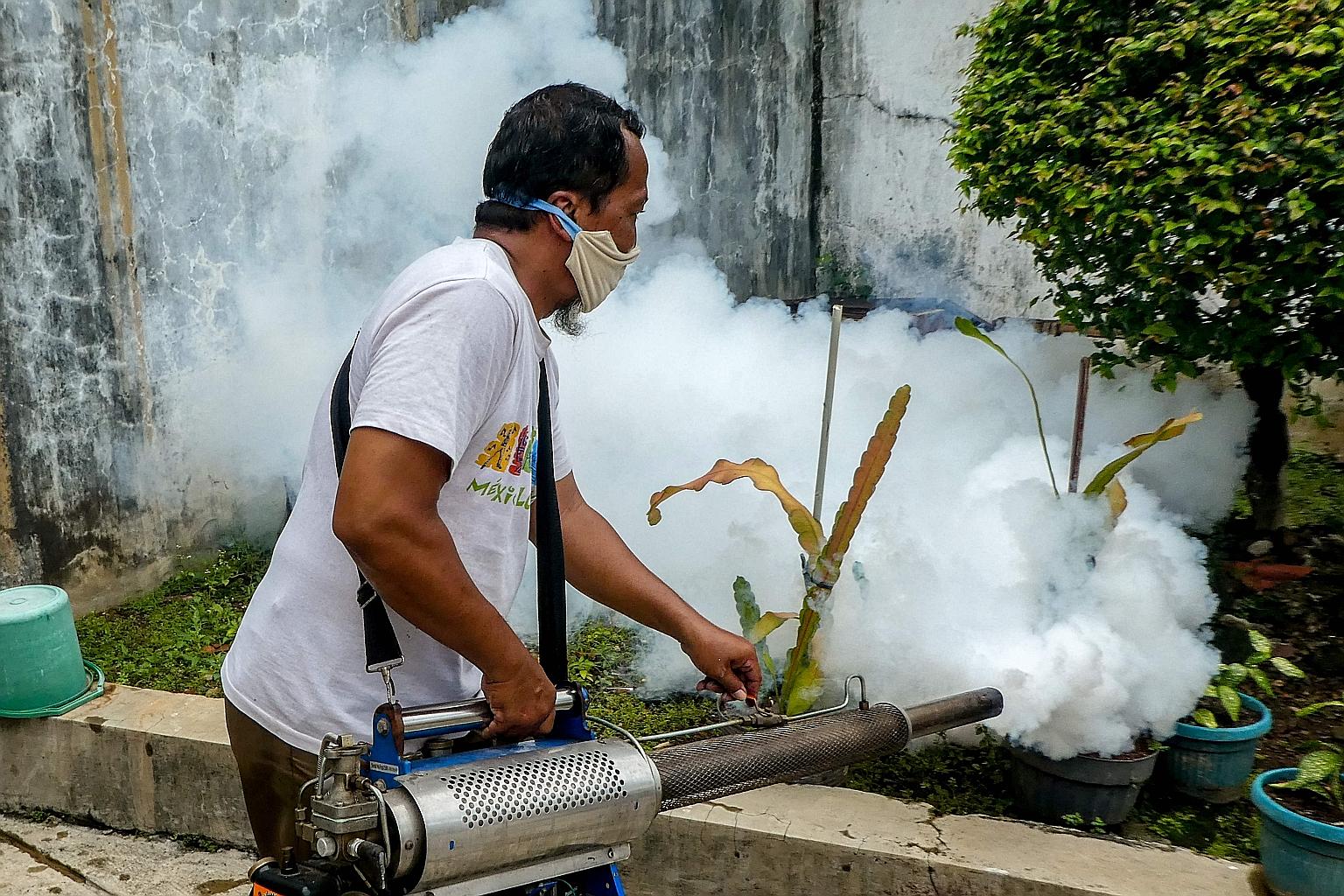Indonesia battles another health crisis as dengue cases continue to climb
Sign up now: Get insights on Asia's fast-moving developments

A man carrying out fogging at a housing complex in Jakarta in April. Experts say the restrictions brought about by the Covid-19 pandemic have hampered efforts to prevent dengue fever.
PHOTO: AGENCE FRANCE-PRESSE
The Indonesian authorities are worried about another health crisis on their hands, dengue haemorrhagic fever, amid the ongoing coronavirus pandemic.
From January to June 17, 64,251 dengue haemorrhagic fever cases were reported, with the death toll hitting 385, according to the Health Ministry.
Tourism hot spot Bali reported the highest number of cases at 8,930, followed by the country's most populous province of West Java with 6,337.
The Health Ministry's director for vector-borne and zoonotic diseases Siti Nadia Tarmizi told The Sunday Times that the 60,000-plus cases recorded this year were fewer than the 98,000 during the same period last year.
But a major concern this year, she said, is why the cases have continued to climb though the peak months of March and April for dengue fever have passed.
The number of fatalities reported so far was also half the figure in the same period a year ago, she added. "We normally see a very low number of dengue haemorrhagic fever (cases) in June… We're still trying to figure out why we still record many cases in June," Dr Nadia said, citing several hundreds of cases in a single day.
With many parts of the country easing social restrictions, the Health Ministry is encouraging operators of office buildings, places of worship and other venues to check the presence of larval mosquitoes and to carry out fogging or apply larvicide.
In 2016, dengue haemorrhagic fever cases and fatalities in Indonesia reached an all-time high, at 204,171 cases and 1,598 deaths.
The world's fourth-most populous nation of about 270 million records only cases of dengue haemorrhagic fever, a severe type of dengue fever marked by bleeding.
The number of dengue fever cases, where patients are usually treated at home with prescribed drugs, is estimated to be 10 times higher than the number of dengue haemorrhagic fever cases, according to Dr Nadia.
Dr Rita Kusriastuti, a vector-borne disease expert, pointed out that the change of weather patterns this year - with the transition from the dry season to the monsoon season occurring in May instead of March - contributed to the high number of cases this month.
She also noted the Covid-19 pandemic has hampered efforts to prevent dengue haemorrhagic fever.
-
8,930
Number of dengue haemorrhagic fever cases in Bali, the highest nationwide.
64,251
Number of cases in Indonesia from January until June 17, down from 98,000 in the same period last year. Cases have continued to rise this month, even after the peak months of March and April for dengue have passed.
"The system put in place to monitor larval mosquitoes both independently by residents and by the government did not work during the pandemic, as all the energy was dedicated to tackling Covid-19," she said.
Dr Nadia said the restrictive measures to curb the spread of Covid-19 had limited the movement of health officers who go door to door to monitor larval mosquitoes and distribute larvicide to residents, locally known as jumantik.
Mr I Wayan Widia, head of disease prevention and control division at Bali health agency, said that the province's significant number of cases was caused by the absence of a mandatory once-a-month clean-up by its residents due to the Covid-19 social restrictions. This, he said, has led to some places such as drains becoming fertile ground for mosquito breeding.
"With the stay-at-home advice, people didn't carry out activities to destroy mosquito (breeding grounds) massively," he said. Other places with water reservoirs, such as hotels and resorts, were left unattended as most hospitality workers were off duty, thus contributing to mosquito breeding, he added.
Ms Erlina Salmun, who is in charge of disease prevention and control at the health agency of East Nusa Tenggara province, attributed the number of fatalities to people's lack of knowledge about dengue fever, leading them to seek medical treatment for their sick family members mostly when it was too late.
"The patients were sent to hospitals only when their condition was already severe," she said.


